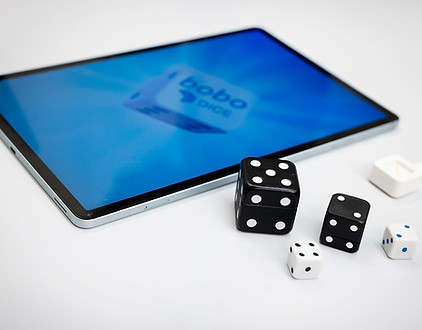The Technology – Smart Dice, Smarter Therapy
BoBo Dice combines motion-detecting smart dice with an engaging digital platform. Each die features 3D motion sensing, colorful LED feedback, and Bluetooth connectivity to track every movement in real-time. The system is designed to support dexterity, in-hand manipulation, and motor-cognitive training through measurable, interactive exercises.


The Dice Shell System - Versatile Training for Every Need
The kit includes 4 Smart Dice with Bluetooth Connectivity, and a range of interchangeable Dice Shells, each designed to add a unique therapeutic challenge:
-
Medium Dice Shell – For adaptive dexterity and size differentiation exercises.
-
Large Dice Shell – For tactile identification and reaction-based activities.
-
D20 Dice Shell – For advanced motor-cognitive challenges using numbers 1–20, improving focus and attention.
-
Color Dice Shell – For color recognition, visual matching, and quick decision-making.
-
Shape Dice Shell – For tactile sensory input, shape recognition, and in-hand manipulation tasks.
Who It’s For
-
Pediatric patients developing fine motor skills
-
Post-surgical and injury hand rehabilitation
-
Neurological rehabilitation (stroke, MS, TBI)
-
Cognitive training (memory, problem solving)
-
Sensory integration therapy
-
Geriatric patients maintaining function and independence


Training Applications
Therapists can create targeted exercises to improve:
-
In-hand manipulation and fine dexterity skills
-
Reaction time in both simple and complex tasks
-
Focus and attention through engaging, game-based challenges
-
Motor-cognitive performance by combining thinking tasks with precise hand movements
-
Sensory-based recognition for shapes, colors, and patterns
Play-Driven Therapy
BoBo Dice turns therapy into play. Every activity involves rotating the dice in the hand with precise finger movements — training dexterity, in-hand manipulation, reaction time, and focus through engaging games. The variety of challenges keeps users motivated, transforming fine motor training into an enjoyable, goal-oriented experience. By integrating play into the process, therapy feels less like work and more like a game you want to keep playing.


Stats
The system records key metrics, including training time, dice rotations, accuracy, speed, performance, cognitive score, and more. These insights provide a holistic view of the patient’s progress and are essential for tailoring effective therapy plans.










